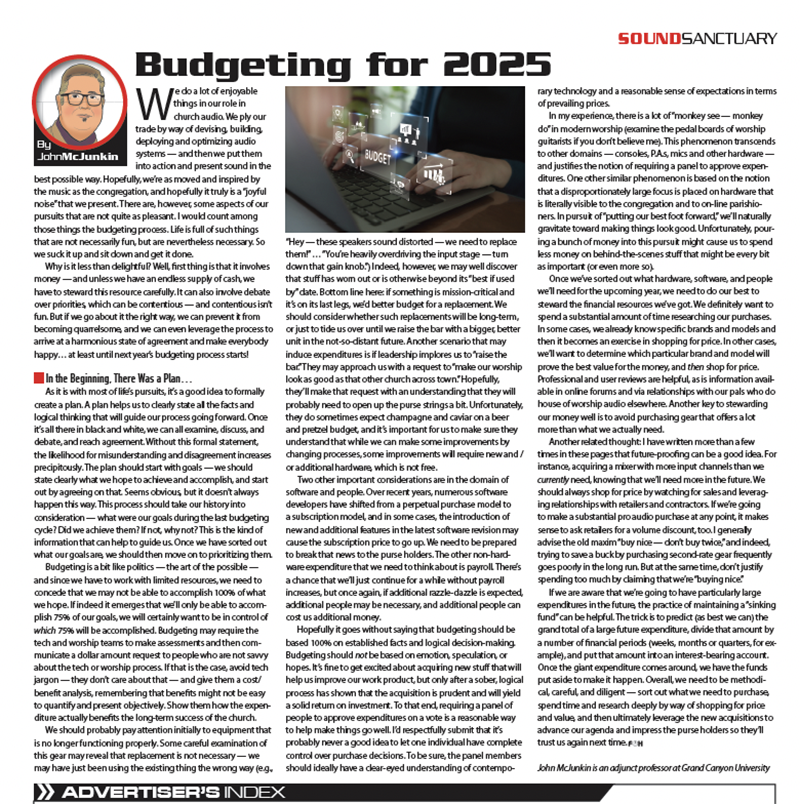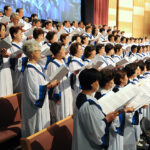
Over the third weekend of October, 2022, my church produced a major annual conference — a four-day affair with multiple worship sets, upscaled production value, guest pastors and hundreds in attendance. Planned for months in advance, it called for numerous rehearsals and required a team of 84 people to accomplish. This annual event rivals or even surpasses Christmas and Easter in terms of production requirements, and is very labor intensive. We are a medium-sized church, lacking the financial wherewithal to accomplish events like this without volunteer staff. We have some professionals and some volunteers, so I get a birds-eye view of both ways of thinking. The hybrid professional and volunteer staffing solution may be the most common paradigm for churches with more than a couple hundred members, but there are certainly churches with all pros and churches with all volunteers, and both of those modalities are legitimate as well. Let’s look at all three options and examine the pros and cons of each.
For our purposes, the focus will be limited to tech staff only. It’s a foregone conclusion that most churches utilize volunteer staff for non-tech roles (setup, hospitality, greeters, etc.) The tech teams are a bit unique within the church ecosystem — it doesn’t take as much training to prepare volunteers to greet congregants as it does to train them to artfully mix 40-plus inputs at front of house. Similarly, if a volunteer forgets to put napkins out with the Danish and coffee, it’s simply not going to have as much negative impact as if an audio volunteer fails to mute a channel when the bassist unplugs, sending a massive pulse of DC into the subs, blowing three 18-inch LF drivers. Our volunteers are sometimes put in charge of expensive technology that can be expensive and time-consuming to replace. We must be cautious and deliberate.
Mitigating the Risks
But if we’re careful and judicious about training and assigning volunteers, we can mitigate the risks, and it does make sense to leverage volunteer labor to help get it all done. But we must be aware that while volunteer labor is less costly than professional labor, the associated cost is still not zero. We’ll need to expend resources to acquire and train volunteers, and we’ll need to show them our appreciation and spend some money to build fellowship and camaraderie. Many people will volunteer not only to serve the Lord, but also to gain some skills that they might eventually be able to leverage toward a professional career, and this enticement is perfectly legitimate. We must be prepared to provide them with relevant training not only to ensure safe operation of expensive gear and quality production, but also because we are providing education in lieu of pay, and it’s only a fair bargain if we take this training seriously and provide valid, beneficial teaching. A careful, well-planned training regimen not only improves our production value and helps to protect our technology investments, but gives volunteers valuable skills that will be of benefit to them. It’s a win-win all the way around. It’s worth mentioning that we’ll occasionally have volunteers who have some understanding of audio, but might require some additional learning to meet our requirements and enable them to do good work. It could even be argued that some volunteers may arrive at our doorstep with just enough understanding to make them dangerous, as the old adage goes. Sometimes good training at present is necessary to overcome poor training in the past.
To that end, training is also necessary to help ensure that our volunteers will adhere to our own internal standards and established procedures. A volunteer might arrive with a decent handle on sound, but insists on “doing things the way we used to do it at my old church.” While highly experienced volunteers might bring well-founded new ideas that warrant changes in policy and procedure, there’s a right way and a wrong way to integrate them into our workflow, and a lone wolf that insists on bucking the system can cause any number of problems.
For example, it usually makes sense for the sake of consistency to have all FOH mixers start with the same baseline mix configuration each week. Not only does this help to achieve some consistency in the overall aesthetic of the mix week in and week out, but it helps to avoid the potentially disastrous confusion that could result from a less experienced mixer arriving on Sunday morning to find the entire console configured in a foreign, unfamiliar way. It’s important to formally determine the skill level of any new volunteer so that gaps in understanding can be filled, and to help guide the new arrivals toward the process formally established by the church. Volunteers who are trained up from audio kindergarten all the way to advanced understanding are vastly more likely to adhere to deliberately entrenched procedures, and that phenomenon is advantageous. A college intern can be an excellent option, provided that the candidate understands that the internship is a valuable opportunity to learn via hard work and careful attention, not a meaningless waste of time that must be endured in order to graduate.
An all-professional staff is really only an option for very large churches with substantial resources, and is hence pretty uncommon. One might conclude that the hiring process needn’t be as rigorous as the screening process for volunteers, but that would be wrong. The competency level of professionals can vary as widely as that of volunteers, and we can’t hand over the keys to the kingdom based on verbal assurances that “I know what I’m doing.” I’m inclined to think that a moderately large percentage of churches do not have a systematic skills assessment regimen in place to make this determination, despite its hopefully obvious advantages. Another consideration is that pros are less likely to exhibit the servant heart that we frequently see in volunteers. I’m not accusing church audio pros as being a pack of cut-throat mercenaries who are only in it for a paycheck, but there’s something to be said for folks who work hard strictly out of love and loyalty. One nice benefit of having a pro or three on staff who really do care and are willing to go the extra mile is that they can be a valuable source of teaching and inspiration for volunteers, particularly those who are on the younger side. It does my heart good to see a group of young volunteers gathered around to learn from the expert who’s been around the block a few times, particularly if the seasoned pro brings charm, wit and a big heart to the young apprentices.
And that example of pros co-mingling with non-professionals brings us to the third and final paradigm to be examined here: a hybrid staff, partially pro and partially volunteer. This scenario is fairly likely among medium to large churches — those with sufficient resources to pay trained, experienced professionals but also recognizing and leveraging the benefits of having volunteers on staff. Employing seasoned, established pros can help attract volunteers who understand the benefit of learning from the old guard. Strategic hiring practices can help to cultivate this benefit by taking care to bring in experts who are not only good at their craft, but also have the servant heart to pour into the volunteer staff and help bring up the next generation of techs. Of course it’s also important to establish job descriptions that align with experience and skill sets — get your aces in their places. If younger volunteers admire the pros in the higher ranks, it can compel them to work hard, learn well, and aspire to move up the ladder.
Striking a Balance
All-professional tech staffing is pretty uncommon, and all-volunteer staffing somewhat less so. The hybrid approach of employing both is most common, and with good reason. Whichever way you would choose to go, it’s always a good idea to hire intentionally, assess skills carefully, provide training purposefully and make church audio work a gratifying blessing.
John McJunkin is the chief engineer and staff producer in the studio at Grand Canyon University.



